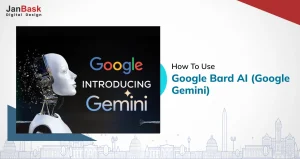
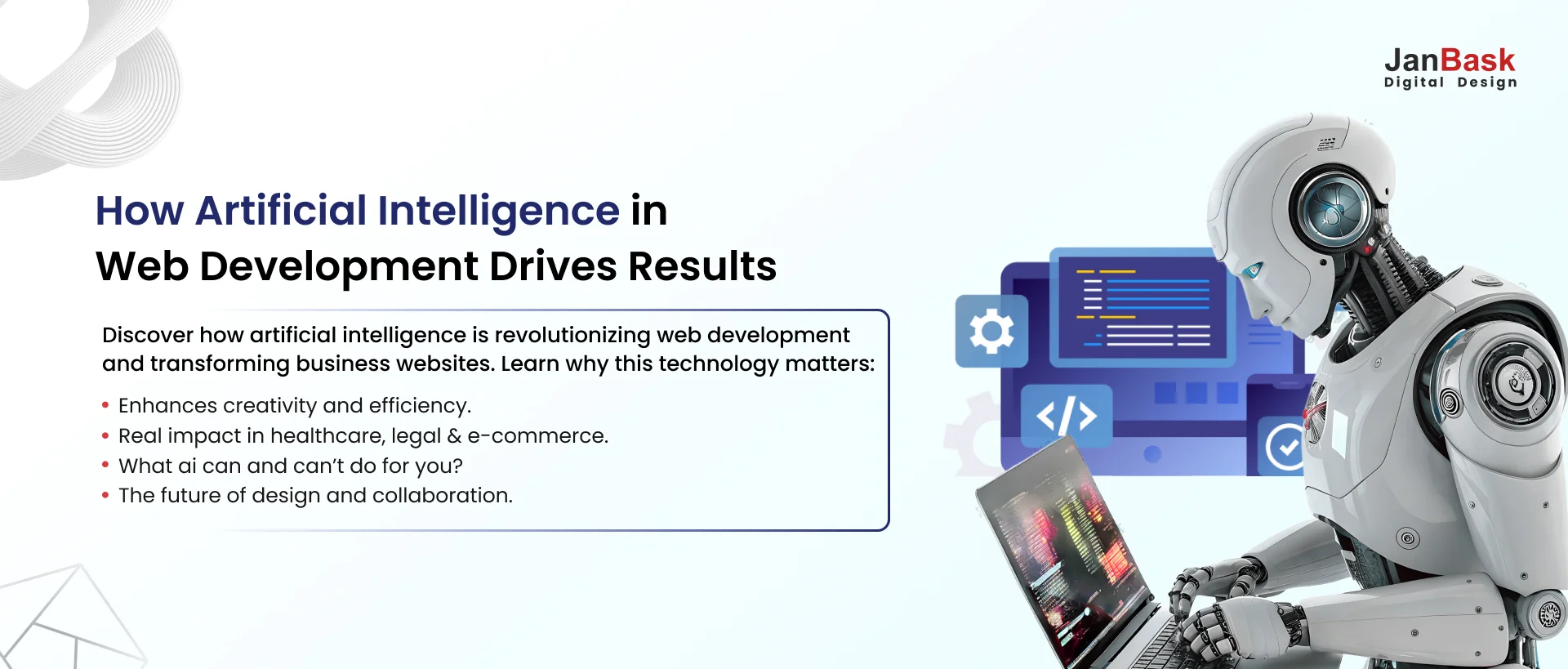
What if you could create websites that seem to read your visitors' minds? What if your website could change itself to give each user exactly what they want?
This isn't science fiction anymore. Artificial intelligence for web design is making these things possible right now. While most businesses still build websites the traditional way, innovative companies are already utilizing AI tools to create something truly remarkable.
Web development companies are experiencing significant changes in their work processes. Some are embracing AI to better and faster serve their clients. Others are still figuring out how to adapt to this new technology.
Here's what might surprise you: 47% of web development tasks can now be automated. That means your website can get better while you sleep. It can learn what your customers like and give them more of it.
Artificial intelligence for web design doesn't replace human creativity. Instead, it empowers creative people. It handles tedious tasks, allowing designers to focus on the big ideas that make your business unique.
You're about to discover how AI for web design can transform your approach to websites. From understanding the technology to seeing real-world applications, AI for web design is opening up new possibilities that weren't available just a few years ago.
Ready to see what's possible?
Artificial intelligence in web development is simpler than it sounds. It means using smart computer programs to help build websites faster and better. These programs can learn from examples and make helpful decisions on their own.
Imagine having a smart helper who works around the clock without getting tired. This helper can write code, suggest design ideas, and fix issues, so you can focus on the bigger goals of your website. Just like how a vpn app for mac quietly works in the background to protect your online activity, AI tools run seamlessly to improve how websites are built and optimized.
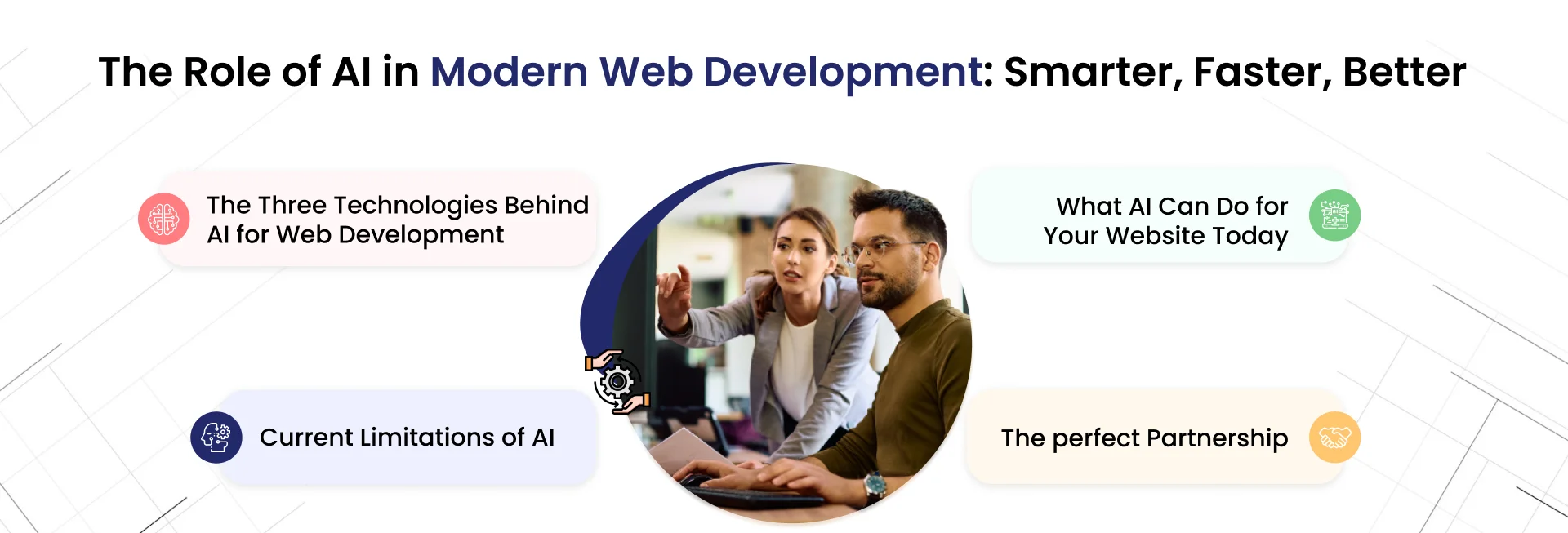
AI in web development is powered by three core technologies: machine learning, natural language processing, and computer vision. Each plays a unique role in how websites are intelligently created and optimized today.
Machine learning enables AI systems to learn from data and improve over time without being explicitly programmed. In web development, ML helps analyze user behavior, personalize content, predict trends, and even automate A/B testing.
NLP allows AI to understand and process human language. In web development, this means developers can input plain English instructions, and AI tools can convert them into HTML, CSS, or JavaScript code—reducing manual work and speeding up production.
Computer vision gives AI the ability to interpret visual content such as images, layouts, or even handwritten wireframes. This helps in auto-generating web designs, optimizing image placements, and improving accessibility by recognizing visual elements.
Today's AI for web development can handle many tasks that used to take hours. It can write basic code for standard website features. It can suggest color schemes and layouts that work well together.
AI can also scan your website for problems and suggest fixes. It can make your site load faster and work better on mobile phones. Some AI tools can even write content for your website pages.
However, artificial intelligence in web development has its limitations. It can't understand your business goals the way a human designer can. It doesn't know your customers or what makes your brand special.
AI can't make creative decisions about complex design problems. It can't handle unique situations that require human judgment. It also can't manage client relationships or explain design choices to your team.
The best artificial intelligence in web development works in tandem with human designers and developers. The AI handles repetitive tasks and provides suggestions. Humans make the final decisions and add the creative touch that makes websites special.
This partnership is what makes AI for web development so powerful. You get the speed and efficiency of machines combined with human creativity and business understanding.
What if you could build websites in half the time? Or design like a pro without needing design experience? With AI, those possibilities are becoming real. Artificial intelligence is changing how websites are built—from writing code to creating content and optimizing performance.
Here’s a breakdown of key areas where AI is transforming web design and development, along with the tools leading the way.
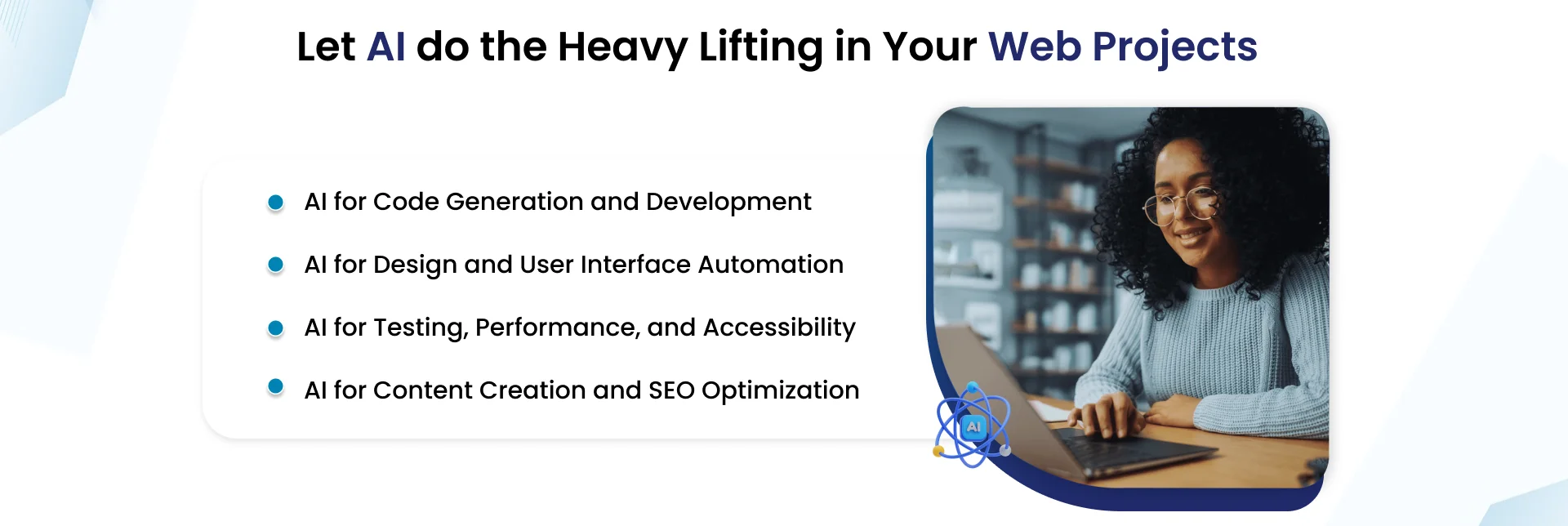
AI coding assistants make the development process faster and smarter by interpreting your intent and generating accurate, functional code in real time. Here’s how the top tools help:
GitHub Copilot acts like a smart partner, suggesting lines of code as you type, or even writing entire functions based on natural-language comments.
OpenAI Codex goes further by turning plain English instructions into actual code, reducing the need for manual syntax writing.
Tabnine supports multiple programming languages and offers smart code completions based on millions of coding patterns, helping reduce errors and speed up development.
AI design tools are transforming the way websites are created. You no longer need advanced design skills—these tools help you generate layouts, maintain visual consistency, and even turn sketches into wireframes. Here’s how the top tools simplify UI/UX design:
Wix ADI builds complete websites for you. Just answer a few questions, and it selects layouts, colors, and content to match your business.
Wizard allows you to sketch out your ideas on paper, take a photo, and instantly convert them into editable wireframes.
Figma AI enhances design consistency by recommending color palettes, spacing, and font combinations that align with modern design standards.
AI tools don't just assist in building and designing websites—they also ensure your site performs well, is bug-free, and accessible to all users. These intelligent systems scan, test, and optimize your website so you can deliver a flawless user experience across all devices and user needs.
Testing tools powered by AI identify broken links, mobile usability issues, and features that may not function properly across browsers.
Performance optimization tools automatically compress images, clean up code, and suggest improvements to speed up your website.
Accessibility checkers use AI to evaluate whether your site is usable for people with disabilities, offering recommendations for better screen reader support, contrast, and more.
AI isn’t just for building or designing websites—it plays a key role in growing your online presence. From writing copy to boosting rankings, AI tools help you create content that resonates with your audience while meeting SEO best practices.
AI writing assistants generate product descriptions, blog posts, headlines, and more—often tailored to your brand tone.
SEO tools use AI to analyze your site and recommend keyword changes, content improvements, and better meta descriptions to boost rankings.
Image optimization tools can compress large visuals and generate alt-text automatically, improving both speed and SEO without manual work.
AI tools are transforming how websites are built—faster development, automated design, and smart optimization. But despite all their benefits, AI tools aren't perfect. Here’s a balanced look at their limitations and strengths so you can make informed decisions when integrating AI into your web strategy.
As advanced as AI tools have become, they still fall short in areas that require complex reasoning, custom logic, or deep technical understanding. For instance, most AI solutions struggle to manage backend systems like databases, secure payment gateways, or custom APIs. These tasks often require human developers who can plan, configure, and troubleshoot in real-time.
AI also lacks the ability to handle advanced server and cloud infrastructure tasks. Whether it's setting up a scalable hosting environment, configuring firewalls, or managing server-side security, these responsibilities still need skilled professionals.
Finally, when it comes to integrating your website with business-critical systems such as CRMs, inventory software, or analytics platforms, AI tools aren’t reliable. These connections must be secure, seamless, and tailored to your operations—something only human experts can ensure.
Despite its limitations, AI brings incredible value when used in the right areas. One of the most impressive strengths lies in code generation. Tools like GitHub Copilot and OpenAI Codex help developers write cleaner, faster code with fewer errors, significantly reducing development time.
In the design world, platforms like Wix ADI and Figma AI are revolutionizing the creative process. They can automate page layouts, suggest style consistency, and even turn sketches into workable digital wireframes—all without a traditional design background.
AI also excels at optimizing website performance. From automatically compressing images to identifying slow-loading elements and improving accessibility, these tools help websites run faster and smoother for every user.
Content and SEO are another strong suit. AI writing assistants can generate blogs, product descriptions, and page copy in minutes, while SEO tools offer smart recommendations to boost rankings and visibility across search engines.
AI won’t replace professionals—it’ll supercharge them. Used wisely, AI speeds up development, sharpens design, and boosts performance. But when it comes to building secure, custom, business-critical solutions? There’s no substitute for human expertise. Think of AI as your accelerator, not your driver. Smart businesses don’t choose between AI and experts—they combine both to win faster.
The impact of AI on web development is bigger than just having new tools. It's changing the entire way websites get built from start to finish. The old way of building websites is being replaced by something much faster and more flexible.
Let's look at how this transformation is happening and what it means for anyone involved in creating websites.

Traditional web development followed a straight line. First, you planned everything out. Then, designers created mockups. Next, developers wrote code. After that, testers checked for problems. Finally, the website went live.
This process took weeks or months. If you wanted to change something, you often had to start over. Each step had to finish before the next one could begin.
Artificial intelligence in web development breaks this linear approach. Now, multiple things can happen at the same time. While you're still planning, AI can already start generating code ideas and design options.
The impact of AI on web development means you can test ideas faster. Instead of waiting for final designs, you can create working prototypes in minutes. If something doesn't work, you can try a different approach without losing weeks of work.
AI also learns from each change you make. The more you use it, the better it gets at understanding what you want.
Here's where the impact of AI on web development gets exciting. Development cycles that used to take 6-8 weeks now take 3-4 weeks. That's a 40-50% reduction in time without sacrificing quality.
AI catches mistakes that humans might miss. It can spot coding errors, design problems, and performance issues before they become big problems. This means fewer bugs and better websites.
The technology also handles boring, repetitive tasks automatically. This lets human developers focus on creative problem-solving and strategic thinking.
Artificial intelligence in web development doesn't just make things faster; it makes them better. You can try more ideas, test different approaches, and make changes without having to start over.
This new workflow enables you to respond to feedback quickly and adapt your website as your business needs evolve. The result is websites that work better for your customers and your business goals.
You might be wondering: Will artificial intelligence for web design replace human designers, developers, and engineers? The answer is no, but it will change how everyone in web development works. The future belongs to people who know how to work with AI, not against it.
Think of it like a race car team. The engine provides speed and power, but you still need a skilled driver, a smart strategist, and experienced mechanics. AI for web design works the same way; it's a powerful tool that makes the whole team better.

AI excels at tasks that require speed and processing large amounts of information. For designers, it can analyze thousands of design examples and suggest layouts that work well. For developers, it can write basic code functions and catch syntax errors instantly.
Engineers benefit from AI's ability to spot performance issues and suggest optimizations. It can review database queries, identify bottlenecks, and recommend improvements that would take humans hours to find.
The technology never gets tired of repetitive tasks. It can resize images for designers, generate boilerplate code for developers, and run continuous tests for engineers, all while you focus on more important work.
Designers bring creative vision and brand understanding that artificial intelligence for web design can't replicate. You know what emotions you want to create and how to make users feel comfortable with your website.
Developers provide problem-solving skills for complex business logic. When your website needs to connect with payment systems, inventory management, or customer databases, you need human expertise to make those connections work properly.
Engineers handle architecture decisions and security considerations. AI can't decide how to structure your servers, protect sensitive data, or plan for future growth. These strategic decisions require human judgment and experience.
The best results happen when designers, developers, and engineers work together with AI. AI handles time-consuming technical work while humans focus on strategy, creativity, and complex problem-solving.
A designer might use AI to generate layout variations, then apply human judgment to choose what fits the brand. A developer might use AI to write basic functions, then add the business logic that makes the website unique. An engineer might use AI to identify performance issues, then implement the solutions that work best for the specific system.
This collaboration lets your entire team create better websites faster than any of you could manage alone. You're not competing with AI, you're partnering with it to build something amazing.
The benefits of AI in web design go far beyond just making websites faster to build. Different industries are seeing real, measurable improvements that directly impact their bottom line. Let's explore how artificial intelligence for website development is transforming specific business sectors.

AI isn’t just speeding up online shopping. It’s making it smarter. With personalized recommendations, dynamic pricing, and AI-powered chatbots that answer questions 24/7, e-commerce brands are transforming passive visitors into loyal buyers. These tools create tailored experiences that boost engagement, conversions, and repeat purchases, all with less manual effort. AI-driven product recommendations can increase conversion rates by up to 4.5 times compared to traditional methods.
AI is transforming legal websites from static pages into intelligent lead generators. Law firms now use AI for everything—from client intake forms that pre-qualify cases to chatbots that schedule consultations. Behind the scenes, AI handles research and document review, saving time and freeing up lawyers to focus on higher-value work. 92% of lawyers using AI report time savings, 33% save up to 10 hours a week.
Healthcare sites are becoming increasingly patient-centric thanks to the use of AI. From smarter appointment scheduling to symptom checkers that guide care decisions, AI ensures patients get help faster and more accurately. It’s not just about automation—it’s about enhancing the patient experience and making care more accessible. The AI healthcare market is projected to grow from $20.9B (2024) to $148.4B by 2029—driven by digital innovation.
AI is the new secret weapon in sales. From qualifying leads to sending personalized outreach, AI helps sales teams focus on hot prospects. 78% of AI-using sales teams report shorter deal cycles, and 70% see bigger deal sizes. Businesses are using AI to reduce friction in the sales cycle and uncover new revenue opportunities faster than ever before.
Think of AI as your website’s competitive edge, not just a feature upgrade. It’s the difference between a site that looks good and one that works hard. AI adapts in real time, learns from user behavior, and delivers experiences that feel personal, seamless, and efficient. Whether it’s reducing bounce rates or driving conversions, AI turns your site into an actual business asset, not just a digital brochure. AI-driven websites can boost customer satisfaction by 30% and cut support costs by up to 40%.
Artificial intelligence in web development is evolving quickly. What requires specialized skills today will become standard practice soon. Understanding these trends now will help you stay ahead of the competition.
These changes represent more than just new tools; they're reshaping how websites are built and how people interact with them.
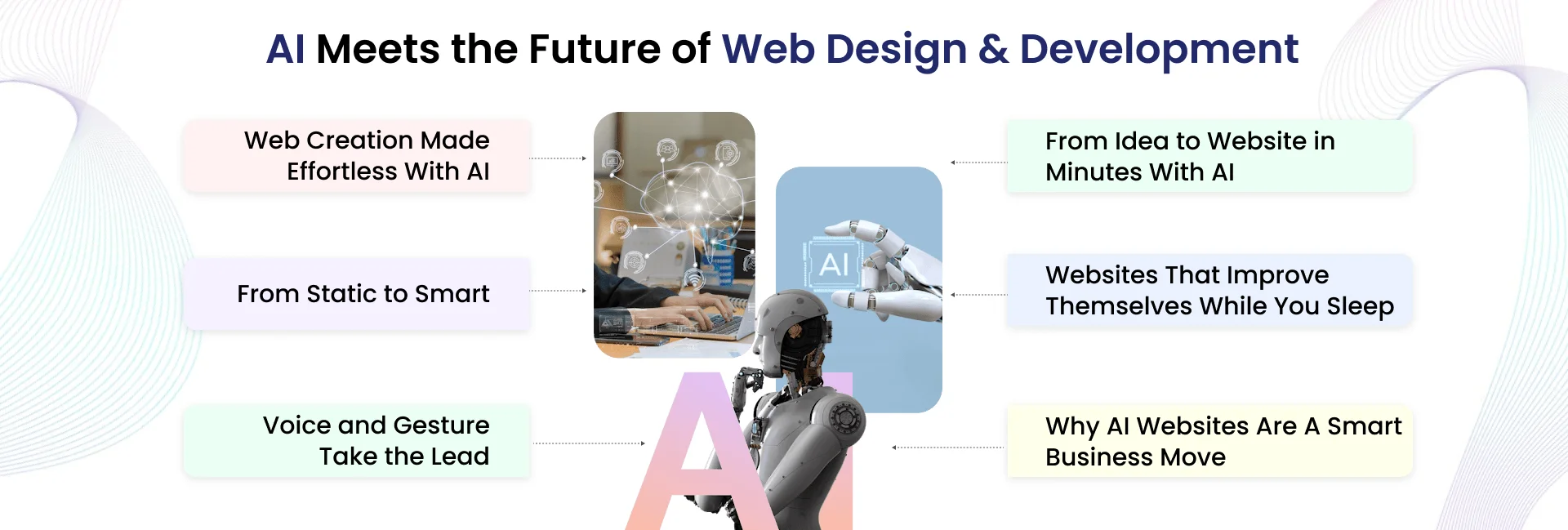
One of the most significant changes is that professional website creation will soon be accessible to anyone, regardless of coding experience. AI platforms will enable users to describe their requirements in plain English, and the system will generate fully functional websites.
This doesn't eliminate the need for developers. Instead, it allows them to focus on complex problem-solving while AI handles routine development tasks.
Future websites will understand each visitor as an individual. They will remember preferences, predict needs, and adapt their structure and content accordingly. This goes beyond personalized content, the entire user experience will customize itself for each visitor.
AI for web development will enable websites to become more effective over time. The more data they collect, the better they become at serving their intended purpose.
Websites will soon respond to voice commands and gesture controls alongside traditional navigation. Users will be able to ask questions verbally and receive immediate responses. Hand gestures will control interactions and navigation.
This advancement will improve accessibility and create more intuitive user experiences across all devices.
AI will soon create complete, professional websites in minutes rather than hours. Users will simply describe their business requirements, provide content, and receive a fully functional website that appears to have taken weeks to develop.
Future websites will improve themselves automatically through continuous testing of designs, content, and layouts. They will implement changes that improve performance and user engagement without human intervention.
AI in web development will make professional websites more accessible and affordable. The technology will handle technical complexity while businesses focus on strategy and customer relationships.
Artificial intelligence for web design is transforming how websites are created by enhancing human expertise rather than replacing it. The technology works best when it partners with human creativity and strategic thinking.
The benefits of AI in web design are real and measurable. Businesses are seeing faster development times, better user experiences, and improved results. AI handles routine tasks so people can focus on solving complex problems and making strategic decisions.
Current AI tools help with coding, design, testing, and content creation. But they still need human guidance for strategy, brand alignment, and creative decision-making.
Artificial intelligence for web design isn't just a trend; it's becoming essential for modern websites. Whether you're planning a new site or improving an existing one, AI tools can help you achieve better results faster.
JanBask Digital Design combines the latest AI technology with strategic expertise to help businesses create websites that deliver real results. Contact us to learn how AI-powered web design can transform your online presence.
Learn How AI Is Transforming Business Websites!

A
This article totally changed how I view the future of web design. Can’t wait to implement AI into my next project!